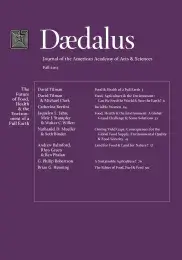Food, Agriculture & the Environment: Can We Feed the World & Save the Earth?
Secure and nutritious food supplies are the foundation of human health and development, and of stable societies. Yet food production also poses significant threats to the environment through greenhouse gas emissions, pollution from fertilizers and pesticides, and the loss of biodiversity and ecosystem services from the conversion of vast amounts of natural ecosystems into croplands and pastures. Global agricultural production is on a trajectory to double by 2050 because of both increases in the global population and the dietary changes associated with growing incomes. Here we examine the environmental problems that would result from these dietary shifts toward greater meat and calorie consumption and from the increase in agricultural production needed to provide this food. Several solutions, all of which are possible with current knowledge and technology, could substantially reduce agriculture's environmental impacts on greenhouse gas emissions, land clearing, and threats to biodiversity. In particular, the adoption of healthier diets and investment in increasing crop yields in developing nations would greatly reduce the environmental impacts of agriculture, lead to greater global health, and provide a path toward a secure and nutritious food supply for developing nations.
The importance of food is undeniable. Stable societies require adequate and predictable supplies of food.1 Modern industrial societies require that most of their members have differentiated and specialized skills, which is only possible when high-yielding crops allow a few people to feed the many. Societies also depend on a multitude of services provided by ecosystems, including the production of pure drinking water, the decomposition of wastes, the creation of fertile soils, the removal and storage of much of the greenhouse gasses released by society, the amelioration of flooding provided by intact ecosystems, and the support of a multitude of other species that provide food, crop pollination, timber, fiber, medicines, and the functioning of Earth’s ecosystems.2
Agriculture–as currently practiced–poses major threats to the environment. Agriculture and food production are responsible for more than 25 percent of total global greenhouse gas (GHG) emissions to . . .
